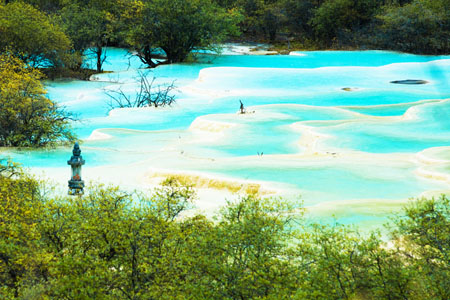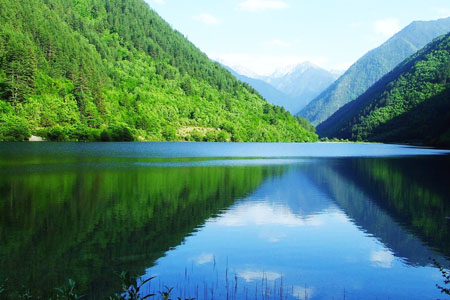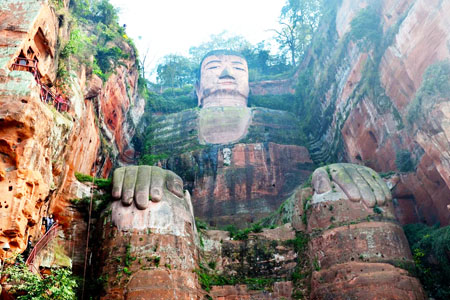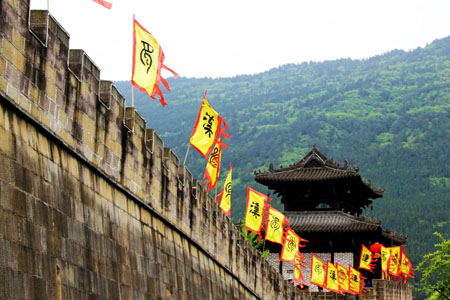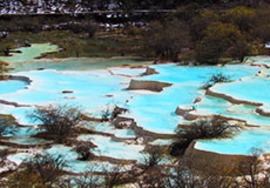A. Brief Introduction
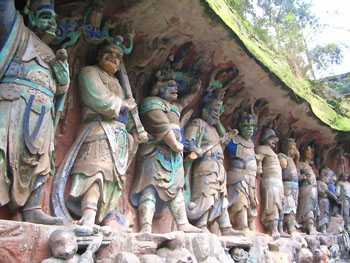 The Dazu Rock Carvings are located in Dazu County, Chongqing Municipality. The construction began in 650, and continued into the 17th century. Thriving since the end of the 9th century, when the grotto art of north China began to decline, the Dazu Rock Carvings are an outstanding representative of China's grotto art in the middle and late period of ancient China.
The Dazu Rock Carvings are located in Dazu County, Chongqing Municipality. The construction began in 650, and continued into the 17th century. Thriving since the end of the 9th century, when the grotto art of north China began to decline, the Dazu Rock Carvings are an outstanding representative of China's grotto art in the middle and late period of ancient China.
So far, a total of some 50,000 statues and 100,000 inscribed Chinese characters are extant, and 75 cliff statue sites are under state protection. The cliff statues on the North Hill, the South Hill, Bading Hill, Stone Hill and Stone Gate Hill are large in size, and well carved and preserved.
The Dazu Rock Carvings occupy an important position in the history of China's grotto art. They include not only Buddhist figures, but also Taoist and Confucian figures, which makes them different from grottoes dating from previous times. Its statues, which have strong national and secular features, and depict many activities of ancient people's daily lives, mark the completion of the localization process of China's grotto art and reflect great changes and developments in China's folk religion and grotto art.
B. Cultural Heritage
The Dazu Rock Carvings mainly contain Buddhist statues, but there are also some Taoist, Confucian and historical figures, and many valuable inscribed tablets. The statues show maturity of carving and national features, breaking new ground in religious art.
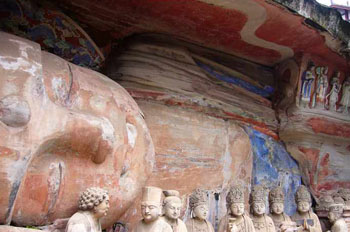 The Dazu Rock Carvings provide rich and valuable material for research into ancient China's culture, arts, philosophy, religion and history. In the spring of 1945, Chinese historians made an overall investigation of the Dazu Rock Carvings, and published their findings, marking the beginning of full-scale research into the Grottoes. The Chinese Government has made great efforts to protect, research and publicize the Dazu Rock Carvings, and in recent years, the Grottoes have attracted a large number of foreign experts, scholars and visitors.
The Dazu Rock Carvings provide rich and valuable material for research into ancient China's culture, arts, philosophy, religion and history. In the spring of 1945, Chinese historians made an overall investigation of the Dazu Rock Carvings, and published their findings, marking the beginning of full-scale research into the Grottoes. The Chinese Government has made great efforts to protect, research and publicize the Dazu Rock Carvings, and in recent years, the Grottoes have attracted a large number of foreign experts, scholars and visitors.
C. Celebrities and Stone Carvings
The Wei Jun Jing Bei, one of the numerous inscribed tablets at the Grottoes, was carved in 895, and is the first written record about the Dazu Rock Carvings. Another tablet (No. 104 of the northern section) carved by Cai Jing of the Song Dynasty. It was flanked by 22 chapters of Book on Piety in Ancient Characters, which were historically singular because they were inscribed in both ancient Chinese and a more modern one.
D. Art Creation
The artisans created these marvelous rock carvings not simply by replicating images that their predecessors had made. Instead, they broke the yoke of religion and created figures with life and dynamic. Their innovations will be recorded in the history of grotto art forever.
E. Detailed Dazu Rock carving Information
Dazu Rock carving is the general name of the grotto art of cliff statues in Dazu District of Chongqing city. The cliff statues in Beishan Mountain and Baoding Mountain are the most famous and best preserved. Dazu Rock carvings began in the end of the Tang Dynasty and went from the Later Liang, Later Tang, Later Jin, Later Han, and Five Dynasties of the Later Zhou Dynasty to the 1162 AD. of the Southern Song Dynasty, which lasted more than 250 years. More than 4,600 Dazu rock carvings are excellent representatives of grotto art in late China, and also represent the highest level of stone carving art in the Tang and Song dynasties. The Dazu rock carvings are as famous as the Dunhuang Mogao Grottoes, Yungang Grottoes, Longmen Grottoes and Maijishan Grottoes.
Dazu rock carvings are mainly Buddhist statues, and Confucian and Taoist statues coexist. The statue is magnificent and dazzling, which truly reflects the historic integration of foreign Buddhist culture and traditional Chinese Confucianism and Taoist culture. At the same time, Dazu stone carvings also present the core values of loyalty, filial piety, integrity, propriety, righteousness and integrity, which is an outstanding representative work of grotto art in late China.
On December 1,1999, Dazu Rock carvings ( Baoding Mountain, Beishan, Nanshan, Shimen Mountain and Shizuan Mountain) were listed on the World Heritage List by UNESCO.
F. Attractions of Dazu Rock Carving
Baoding Mountain Rock Carvings
Dazu Baoding Mountain Rock carving is located in Dazu Longgang Town, 15 kilometers northeast of Baoding Town. Baoding Mountain rock carvings are centered on Shengshou Temple, including the Large Buddha Bay and nearly 10,000 large Buddhist temples in Little Buddha Bay. Almost all the Buddhist code are invluded. Baoding Mountain innovates the forms and exquisite skills with "the humanization of god and man", and nationalizes, lives and seculars the Buddhist allusions. Baoding Mountain rock carving art can be appreciated and felt by tourists of various cultural levels, which is the essence of Dazu stone carving.
The stone carvings of Baoding Mountain were carved by the great master Zhao Zhifeng during the Southern Song Dynasty. The project lasted for more than 70 years and is a large Buddhist temple. The stone carvings are majestic, magnificent, and full of life breath. Nearly ten thousand statues are like a scroll of pictures engraved on the more than 500 meters long cliff, connecting the front and back contents, and the carving without the same, pushing the Chinese grotto art to the highest peak. The Guanyin statue of Baoding Mountain is known as "the national treasure of the national treasure".
Beishan rock carvings
Beishan cliff statue is located in Beishan, 1.5 kilometers north of Dazu District, Chongqing. The Beishan cliff statue is more than 300 meters long and is 7-10 meters high. Beishan rock carvings grottoes are as dense as beehives, divided into south, north two sections. Beishan rock carvings are dazu Buddhist grottoes art appreciation and tourism holy land. The rock carvings have distinctive personalities, beautiful posture, well-proportioned proportions and gorgeous clothes. There are nearly ten thousand statues, with 51 kinds of various themes, mainly in the Buddhist tantra. No.136 wheel Sutra Cave is the essence and representative of the Song Dynasty stone carvings, which can be called the "treasure of the town mountain" of Beishan rock carvings. The Guanyin statues in the cave are beautiful, exquisite and lifelike, and the overall layout is harmonious and well preserved, which can be called a great collection of Oriental beauty gods.
Shimen Mountain rock carvings
Shimen Mountain Grottoes is located at the top of Shimen Mountain, Xinsheng Village, Shima Town, Dazu City, Chongqing. The theme of Shimen Mountain rock carvings is mainly the stories of Buddhist and Taoist characters. It is the largest statue area of Buddhism and Taoism among Dazu rock carvings, especially the Taoist grottoes have the most artistic characteristics. The works of Longmen Mountain are full in shape and realistic, combining the majestic temperament of god with the vivid manner of people, making them unique in the Chinese rock carving art.
Stone Seal mountain rock carving
Shizhuan Mountain is located in Fohui Village, Sanqu Town, about 20 kilometers away from Dazu District, Chongqing. It is named because of the ring of "Zhuan". Shizhuan Mountain rock carving is the earliest statue area of Confucianism, Buddhism and Taoism in China, especially the no. 6 niche Confucian grottoes statues "Confucius ten sages niche" are rare in the world.
Nanshan Rock carvings
Dazu Nanshan rock carvings are located 2 kilometers south of Dazu Longgang Town. The Nanshan rock carvings, represented by the "Sanqing Ancient Cave", have 421 statues, reflecting the use of a winding method in Taoist rituals in the shape of the caves. Among the Taoist grottoes in the Song Dynasty of China, the grottoes are the most beautifully carved and with high religious, historical and artistic value. Nanshan stone carvings is the most rare pure Taoist statue with the most concentrated and complete fairy system in Chinese cave art. It is also the most bookish grottoes in Dazu stone carvings.
Dazu Rock Carving Tours and pacakges

 The Dazu Rock Carvings are located in Dazu County, Chongqing Municipality. The construction began in 650, and continued into the 17th century. Thriving since the end of the 9th century, when the grotto art of north China began to decline, the Dazu Rock Carvings are an outstanding representative of China's grotto art in the middle and late period of ancient China.
The Dazu Rock Carvings are located in Dazu County, Chongqing Municipality. The construction began in 650, and continued into the 17th century. Thriving since the end of the 9th century, when the grotto art of north China began to decline, the Dazu Rock Carvings are an outstanding representative of China's grotto art in the middle and late period of ancient China. The Dazu Rock Carvings provide rich and valuable material for research into ancient China's culture, arts, philosophy, religion and history. In the spring of 1945, Chinese historians made an overall investigation of the Dazu Rock Carvings, and published their findings, marking the beginning of full-scale research into the Grottoes. The Chinese Government has made great efforts to protect, research and publicize the Dazu Rock Carvings, and in recent years, the Grottoes have attracted a large number of foreign experts, scholars and visitors.
The Dazu Rock Carvings provide rich and valuable material for research into ancient China's culture, arts, philosophy, religion and history. In the spring of 1945, Chinese historians made an overall investigation of the Dazu Rock Carvings, and published their findings, marking the beginning of full-scale research into the Grottoes. The Chinese Government has made great efforts to protect, research and publicize the Dazu Rock Carvings, and in recent years, the Grottoes have attracted a large number of foreign experts, scholars and visitors.
